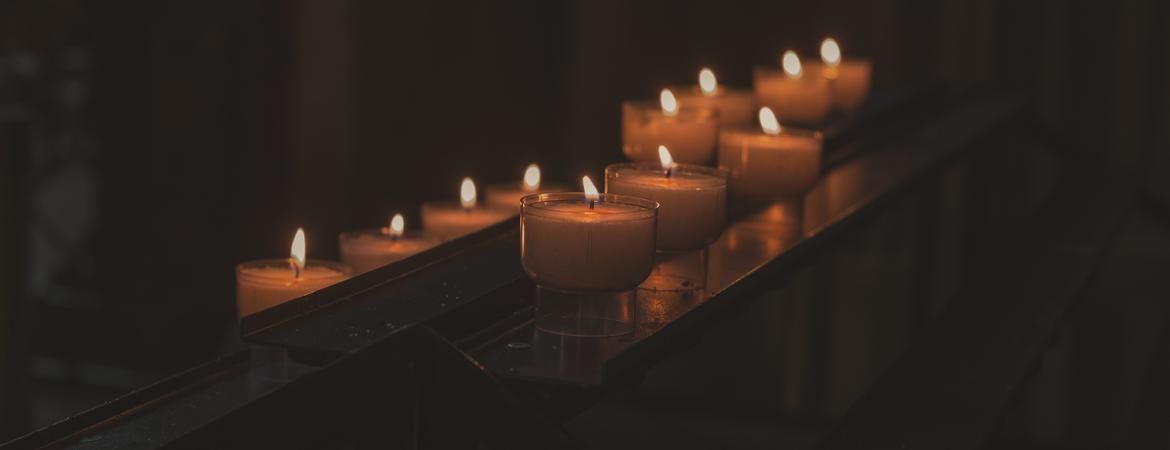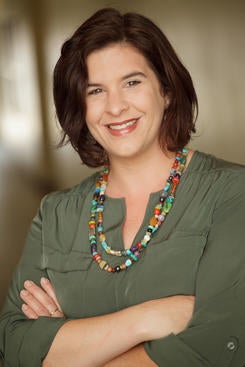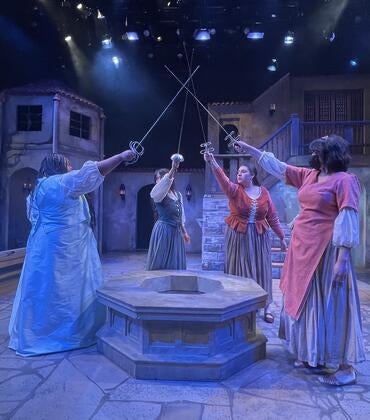
An associate professor at the University of California, Riverside, will lead a team of researchers in a five-year study of sexual abuse across a variety of religious traditions and communities.
Amanda Lucia, who teaches in UC Riverside’s Department of Religious Studies, is the principal investigator of the Religion and Sexual Abuse Project, which is funded by a $550,000 grant from the Henry Luce Foundation through its Theology program.
Lucia and her five main co-researchers — all religious studies professors at universities across the country — each specialize in a particular religious tradition. Together, their expertise includes Catholicism, Buddhism, yoga, and contemporary guru movements situated primarily within Hindu traditions. Each will receive approximately $20,000 in funding to develop research projects on this topic.
The team will also select six additional researchers who specialize in other religious traditions — such as Judaism or Protestantism, Lucia said — to receive $20,000 subgrants of their own, bringing the total number of researchers involved to 12.
“There needs to be more scholarly attention to this matter,” Lucia said. “Usually, the media is in the driver’s seat with coverage of sexual abuse scandals in religious communities. But as scholars, we need to use some of our critical resources, depth of knowledge, and skills in unraveling complex problems to approach this issue.”
Lucia noted a central aspect of the grant is the researchers’ partnership with four advocacy organizations: FaithTrust Institute, Bishop Accountability, Yoga Alliance, and INFORM. In collaborating with these groups, the researchers hope to create practical benefits for religious communities in which abuse has occurred, she said.
Another key goal is to influence the field of religious studies by acknowledging that abuse and trauma are sometimes part of the religious experience — or even built into religious structures — and thus worth studying.
“We have departments of religion all across the nation and around the world, but many don’t teach about abuse or take a critical look at something that’s an unfortunate fact,” Lucia said. “They may not know how to talk about it in the classroom, so one of our researchers, in particular, will be working on pedagogical materials, thinking through how to teach this part of religion that’s so commonplace but often ignored by scholarship.”
Lucia’s own research bridges the U.S. and India, where she investigates contemporary charismatic leaders and guru movements. Using grant funding, she’ll conduct ethnographic research in both countries, considering the concept of abuse and how devotees of gurus often justify such treatment through alternative moral and ethical frames.
“This project’s subject is something I began taking note of as I looked at the guru field and saw that there were so many accusations against gurus for sexual misconduct — at all levels and genders,” Lucia said. “When we hear about these things in the media, it’s always about the moral failings of the individual. But my research is seeking to find out if there’s something more structural at play that is broader than one individual’s failings.
“I don’t have any desire to choose a particular guru and write an exposé,” she added. “I am more interested in thinking sociologically about what patterns we can find, and why it is that this is a commonality.”
Another of the project’s six main team members, Andrea Jain of Indiana University-Purdue University Indianapolis, will build on her research on the global yoga industry and influential gurus and teachers who have sexually assaulted students or otherwise been complicit in sexual violence.
“In the popular imagination, doing yoga is associated with health and wellness, women’s empowerment, peaceful coexistence, and universalism,” Jain said. “Yet sexual violence in the yoga industry is a serious, multifaceted, and persistent problem, and many industry leaders and teachers get away with it, sometimes for years or longer.”
Jain described her work as an attempt to evaluate the problems at the intersections of yoga, sex, and religion as yoga becomes increasingly commercialized and impacted by capitalist corporate structures.
“My hope is that using neoliberal capitalism as a framework for understanding the intersections of sex and religion will illuminate ways communities might prevent sexual violence from happening or responsibly respond when it does happen,” she said.
In addition to Lucia and Jain, the project’s main research team includes:
- Ann Gleig of the University of Central Florida and Amy Langenberg of Eckerd College, who will work together to explore sexual abuse within Buddhism from both classical and contemporary perspectives.
• Holly Gayley of the University of Colorado, Boulder, who will study Tibetan Buddhism, examining sex scandals in convert Buddhist communities established by Tibetan teachers, such as the international network of Shambhala centers based in Nova Scotia.
• Kent Brintnall of the University of North Carolina at Charlotte, who will analyze the Catholic church’s sexual abuse crisis, situating it within the contexts of sexuality, homosexuality, and LGBTQ politics.
The researchers’ work will result in a variety of outputs: academic articles and a themed journal issue, three monographs, online and pedagogical resources, and a series of public events and workshops. In years two and four of the grant period, the team will stage two large, public-facing conferences where scholars, community members, and the project’s partner organizations will come together for panels and discussions, Lucia said.
“In light of the plethora of sexual abuse scandals that have happened — for a long, long time, but particularly the ones that have been publicized over the past 40 years or so — I think communities are really struggling with what to do,” she added. “We want this grant to support organizations that are helping to figure that out, whether it’s by helping them to understand how religion and abuse intersect or by helping them to develop resources.”
For more information on the Henry Luce Foundation and details on other grants awarded alongside the grant to UC Riverside, please visit: https://www.hluce.org/news/articles/luce-foundation-awards-14-million-new-grants/.
Header photo by Thomas Dumortier via Unsplash.




